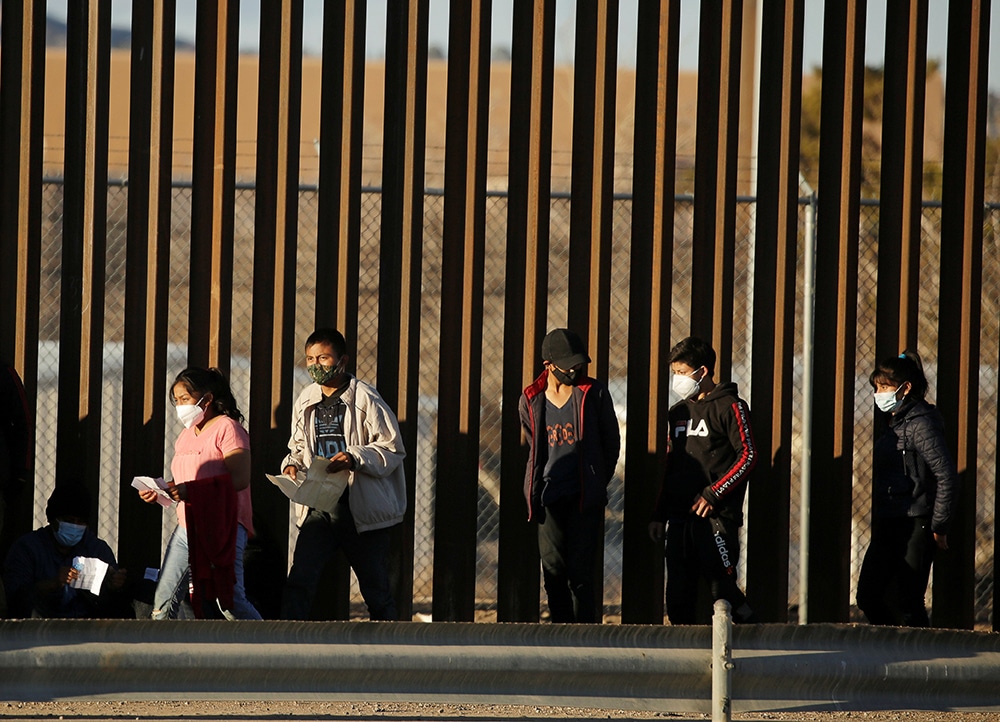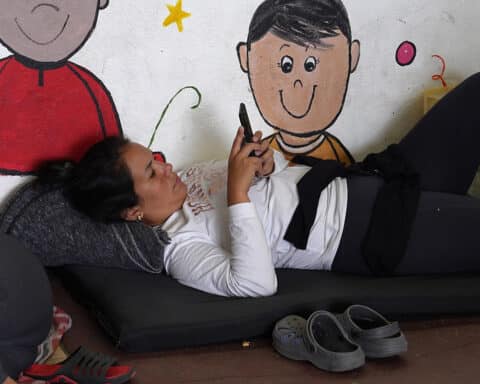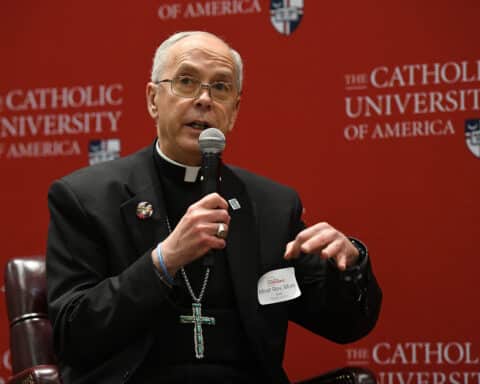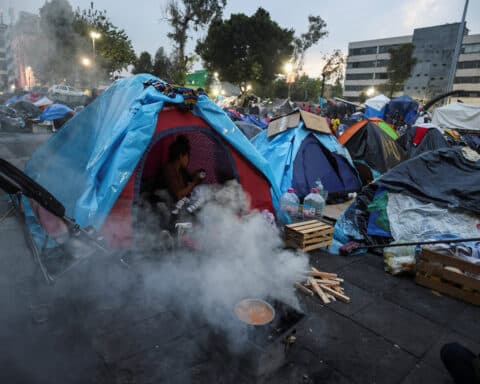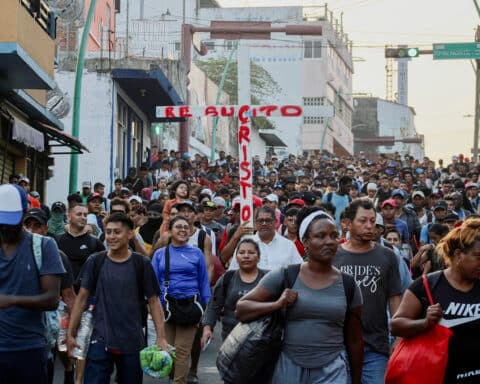Twenty-five migrants, most of them from Central America, walked along the pedestrian path on the Bridge of the Americas, located near downtown El Paso, Texas, on a recent Friday afternoon. They traveled from Ciudad Juárez, El Paso’s sister city on the Mexican side of the U.S. southern border, where they had been forced to wait for almost two years while their asylum claims were pending in U.S. immigration courts.
“It’s nice to be able to give people good news for a change,” said Melissa Lopez, the executive director of Diocesan Migrant and Refugee Services in El Paso.
Lopez greeted the migrants as they presented themselves at the El Paso port of entry to the U.S. Customs and Border Protection agents, who allowed them to cross the border after an initial health screening.
“‘I can tell you they were definitely eager and excited to be entering the United States, especially the kids,” said Lopez, who had met the migrants a few hours earlier at an immigrant processing center in Juárez to prepare them for the border crossing.
“‘It was pretty cool. Because we knew their faces, as soon as they came to the doors, we knew exactly who they were,” said Lopez, who told Our Sunday Visitor that she expects as many as 4,000 migrants to cross the border in El Paso over the next three months.
“The goal is to have everyone processed by the end of May,” Lopez said.
Over the next several weeks, hundreds of migrants each day will cross the ports of entry along the U.S.-Mexican border in Texas, Arizona and California. In late February, the Biden administration began registering asylum-seekers who have been residing in Mexico because of a Trump-era policy known as the Migrant Protection Protocols.
At least 25,000 migrants with active asylum cases in the United States have been living in Mexican migrant camps since the Trump administration implemented the Migrant Protection Protocols — also known as the “Remain in Mexico” policy — in 2019. Under the program, more than 65,000 asylum-seekers were denied entry into the United States and sent back across the border to stay in camps that were sometimes squalid or dangerous. Most returned to their countries of origin.
In recent weeks, Catholic immigration agencies along the border have been busy helping those migrants who enter the United States. They have provided the asylum-seekers with temporary shelter, food, clothes and toiletries. In Southern California, Catholic Charities of San Diego is planning to open a temporary shelter for migrants and asylum-seekers.
“These are folks who are from Central America, even from other parts of the world,” said Appaswamy “Vino” Pajanor, the chief executive officer of Catholic Charities of San Diego.
Volunteers and Catholic immigration attorneys and caseworkers have also helped the migrants to contact relatives and sponsors in the United States and to make travel arrangements to where they will live while their asylum cases are active.
“Our goal is for all those people to get information about how to access [the program] and get an individual orientation before they’re able to go through the process,” said Joanna Williams, the executive director of the Kino Border Initiative, a Catholic binational agency located in Nogales, Arizona and Nogales, Mexico.
Williams told Our Sunday Visitor that there are an estimated 200 migrants who have been waiting in Nogales, Mexico — some of them for more than a year — with active asylum cases in the United States.
“The reality is most of the people here in Nogales are going to be some of the last people who are eligible [to cross the United States border] because the overall program started almost a year before it started here in Nogales, and they’re doing it in order of the date that someone was enrolled,” Williams said.
On Feb. 19, San Diego became the first port entry to open for asylum-seekers previously forced to wait in Mexico. Since then, at least 25 people — most of them families and women with young children — have crossed the border every day in San Diego.
Pajanor told Our Sunday Visitor that those daily border crossings could double or triple in the next few weeks. Those figures do not include large numbers of Haitian refugees who have also been entering the United States over the past year.
“This will be going on for many months. It’s not going to go away overnight,” said Pajanor, who added that Catholic Charities is appealing to parishes in San Diego to help support the migrants who will be staying in its short-term transitional shelter.
“We are begging and asking people to give us support,” Pajanor said.
Meanwhile, in the border city of Laredo, Texas, an estimated 800 people could be crossing through the local port of entry over the next few months.
“There may be more than that who are registered here, or there could be less because some families may have either moved over to another port of entry or gone back to their country,” said Rebecca Solloa, the executive director of Catholic Charities of the Diocese of Laredo, Texas.
Solloa told Our Sunday Visitor that she expects it will take two to three months to process all the asylum-seekers in Laredo. The agency will transport them from the port of entry to a nearby Catholic Charities facility.
“They’ll get some respite and relief, a chance to relax before they go to the bus station, which we’ll transport them to a couple of hours before they leave to their final destination,” Solloa said. “If they have to shower, they’ll be able to shower. If they need something to eat, we’ll provide meals for them. If they have questions about any part of their journey, questions about the paper documents that they’re carrying, we might be able to answer those questions for them.”
Solloa said Catholic Charities sees its immigration work as a humanitarian service for migrant families and children, adding that she hopes they are accepted and treated with respect in the communities where they will be living around the country.
“The work that Catholic Charities does and other nonprofit organizations do is really to help these families in a very dignified manner,” Solloa said. “The families and children deserve to be well-respected and treated with dignity.”
Brian Fraga is a contributing editor for Our Sunday Visitor.

